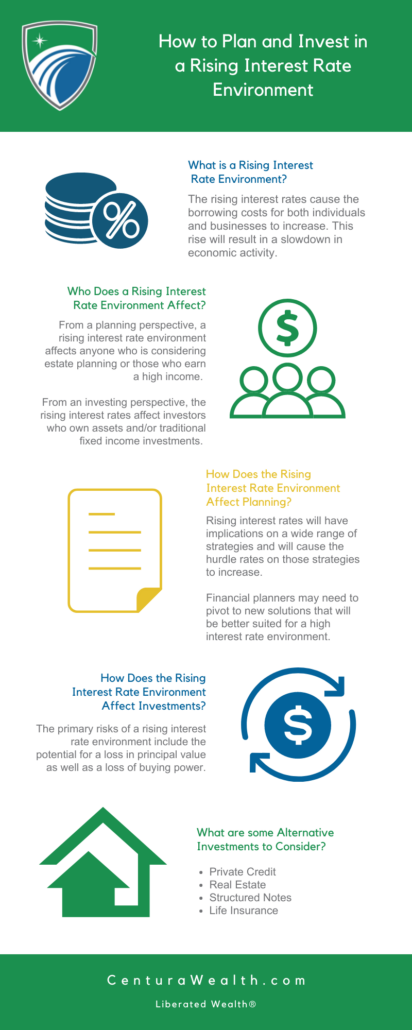How to Plan and Invest in a Rising Interest Rate Environment
At Centura, we are dedicated to our role as stewards in leading our clients to purposeful financial planning and investing strategies to ensure their success. One of our goals is to help our clients navigate and understand challenging economic changes, such as the current rising interest rate environment.
Listen to our podcast, Live Life Liberated, for a detailed discussion from Sean Clark and David Cariani as they outline financial planning and investment strategies to help you cope with rising interest rates.
What is a Rising Interest Rate Environment?
In 1981, interest rates peaked at about 16%. For the next forty years, interest rates trended downward steadily and reached a low during the COVID-19 pandemic at about .05%. Rates currently stand at a little over 2.5%.
The rising interest rates cause the borrowing costs for both individuals and businesses to increase. This rise will result in a slowdown in economic activity because businesses will be less inclined to borrow money unless they are certain they will be able to earn more money than they paid to borrow.
This rise in interest rates will lead to what Sean and David call a “dampening in economic activity, both on a micro and macro level as the cost of capital increases.”
Who Does a Rising Interest Rate Environment Affect?
From a planning perspective, a rising interest rate environment affects anyone who is considering estate planning for estates that are at, near or above the estate tax exemption threshold or those who earn a high income.
From an investing perspective, the rising interest rates affect investors who own assets and/or traditional fixed-income investments like bonds.
How Does the Rising Interest Rate Environment Affect Planning?
In financial planning, interest rates are used to determine the economics of different strategies. Rising interest rates will have implications on a wide range of strategies and will cause the hurdle rates on those strategies to increase.
As a result, financial planners may need to pivot to new solutions that will be better suited for a high-interest rate environment.
How Does the Rising Interest Rate Environment Affect Investments?
The primary risks of a rising interest rate environment include the potential for a loss in principal value as well as a loss of buying power.
For example, in the current inflationary environment, if an investor’s earnings are 2.5% and prices are increasing significantly–approximately 6-7%–the investor will have 4.5% less buying power at the end of the year than they did at the beginning.
Additionally, short-term bonds are less sensitive to the increased rates of a high-interest rate environment than longer-maturity bonds. Longer-maturity bonds may lock in rising rates for longer-time periods whereas shorter-term bonds require a shorter commitment to the high rates and will allow investors to move on to better opportunities.

Alternative Investments to Consider Over Traditional Fixed Income
Private Credit
Investors may enter private credit investments because of their floating rate loans, which will limit the interest rate risk associated with other forms of investment, such as traditional fixed-income investments.
Life Insurance
Life insurance can be a powerful vehicle for alternative investments. It provides downside protection, high liquidity, and an attractive upside potential relative to investments with a similar risk profile.
Check out episode 31 of our podcast, Live Life Liberated, to learn more about how life insurance solutions can be used as an alternative to fixed-income investments.
Structured Notes
Structured notes, written by high credited banks, are customizable and well-suited for a rising interest rate environment and can help investors maintain returns. For more detail, listen in to Episode 35 of Live Life Liberated, “Structured Notes Simplified with Robert Sowinski.”
Real Estate
Real estate can appreciate with inflation on a long-term basis and prove to be a tax-efficient investment. According to Forbes, “real estate investments have the characteristic of performing well in a rising rate environment. In particular, income-generating real property and multifamily have historically…shown a greater ability to grow net income during expansionary periods than securities and other assets.”
Listen in to learn more about the rising interest rate environment and how it affects financial planning and investing, or check out our blog for more information, such as how Centura can help you liberate your wealth.
Centura Wealth does not make any representations as to the accuracy, timeliness, suitability or completeness of any information prepared by any unaffiliated third party, whether linked to or incorporated herein. All such information is provided solely for convenience purposes and all users thereof should be guided accordingly.
We are neither your attorneys nor your accountants and no portion of this material should be interpreted by you as legal, accounting, or tax advice. We recommend that you seek the advice of a qualified attorney and accountant.
For additional information about Centura, please request our disclosure brochure as set forth on Form ADV using the contact information set forth herein, or refer to the Investment Adviser Public Disclosure website (www.adviserinfo.sec.gov). Please read the disclosure statement carefully before you engage our firm for advisory services.



